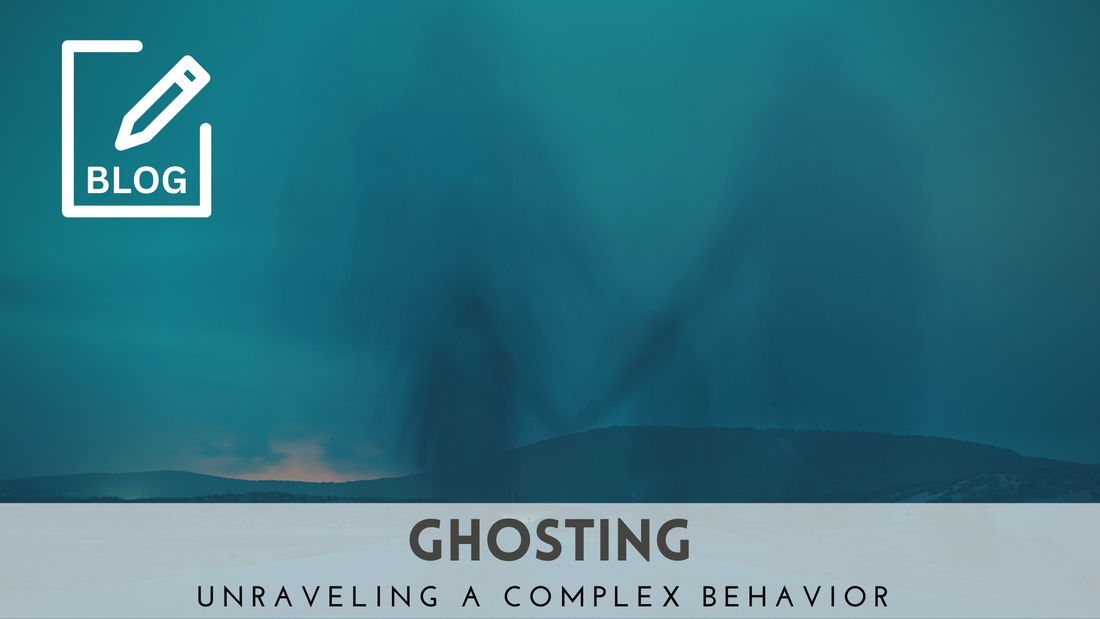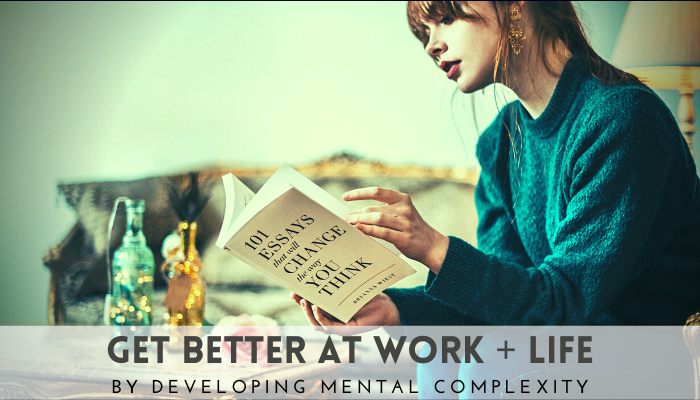|
This Blog was written to help you understand one of the most bewildering communication approaches - Ghosting. If you have had someone suddenly and intentionally cut off all communication with you without any explanation, justification, or warning after a period of consistent communication or even after a few interactions the following information may help you understand why they may have disappeared. It's not a 'magic' trick... there's so much more to this complex (and often hurtful) behavior. In the Blog I focus predominately on the ten common reasons why someone may have suddenly disappeared from your life. I look at it from the 'Ghosters' mindset. This doesn't mean the one who has been 'Ghosted' hasn't played a part in the situation. Contributor: Georgia Ellis In the work I do I am often helping my clients make sense of situations where all of a sudden communication with another person suddenly ceases without any real explanation. I too have experienced this personally and professionally (Mostly from decision makers in large organisations who engage my services, get a proposal and then… nothing but crickets), its bewildering, hurtful and often frustrating to the person who has been cut off and even if we have the mental complexity and emotional awareness to meet the demands of the situation, if the other person doesn’t then what we thought were meaningful relationships can suddenly slip away. “The most painful goodbyes are the ones that are left unsaid and never explained.” — Jonathan Harnisch, Freak Ghosting really is a bit of a head-scratcher in today's world and sadly it seems to be happening more and more. 👻 If you’ve experienced it firsthand and wondered why people choose to ghost others, let me help you with some of the psychology behind this complex (and often hurtful) behavior. Why Ghosting Happens Ghosting isn't just about a lack of communication skills on the part of the person doing the ghosting. It often stems from a mix of emotions, circumstances, emotional immaturity, and limited mental complexity (sometimes by both parties). 10 Reasons Why You're Being Ghosted 1. Lack of Maturity Immature individuals might prioritise their own needs, feelings and comfort over the impact of their actions on others. This can sometimes occur on both sides of the Ghosting situation. For the ‘Ghoster’ sudden disconnection can seem like an easy way to avoid discomfort without considering the emotional toll it can take on the other person and for the ‘Ghosted’ they may be ignorant of the impact they are having on others. 2. Limited Mental Complexity Some individuals struggle to fully grasp the impact of their actions on others due to limited interpersonal skills and inability to understand different perspectives, values and emotions. 3. Accountability Avoidance Someone lacking maturity or mental complexity might struggle with taking responsibility for their actions. Ghosting provides an escape from facing the consequences of their behavior or explaining themselves. 4. Conflict Avoidance Sometimes, the fear of confrontation or difficult conversations leads people to ghost. It's like hitting the "escape" button to avoid discomfort. 5. Uncertainty When feelings are murky or they're unsure about the relationship's direction, ghosting can seem like a way to buy time and figure things out. 6. Digital Disconnect In today's digital age, the emotional impact of ghosting might feel less real due to the impersonal nature of online communication. The growing need for instant replies may make you think you’ve been ghosted when someone has simply switched off. 7. Self-Protection Individuals with low self-esteem or a fear of rejection might ghost as a defense mechanism to shield themselves from potential hurt. 8. Emotional Immaturity Ghosting can arise from a lack of emotional maturity, making it challenging to navigate and communicate complex feelings and handle relationships with consideration. 9. Inexperience in Relationships Individuals who are less experienced in navigating relationships might resort to ghosting as a coping mechanism simply because they haven't yet learned healthier ways to handle your behaviour. (a curse of our digital world) 10. Priorities Clash Sometimes, juggling life's demands can become overwhelming, leading someone to unintentionally disconnect. A Call For Empathy While ghosting might seem like an easy way out, in the long run it’s an uneducated approach that pulls humanity backwards. If you use Ghosting as an approach, or you have been Ghosted, it's essential to reflect on the role you are playing in the situation and consider the emotions on the other side. In the communication masterclasses I run we highlight the need to bring more curiosity, courage and compassion to our interactions and remembering that we're all human (yes we make mistakes - #apologise) By dialing up these three approaches we can create stronger meaningful connections. “The only thing more unthinkable than leaving was staying; the only thing more impossible than staying was leaving. I didn’t want to destroy anything or anybody. I just wanted to slip quietly out the back door, without causing any fuss or consequences, and then not stop running until I reached Greenland.” ― Elizabeth Gilbert, Eat, Pray, Love Healthy Alternatives: Instead of ghosting, build your emotional intelligence and mental complexity by trying some of these healthier ways to manage relationships: 1. Open Communication: Share your thoughts and feelings to help others better understand whats going on and collaborate on a resolution. 2. Setting Boundaries: It's okay to take space, but communicate that you need time or your needs have changed instead of disappearing. Share whats important to you in the situation and why you may need some time. 3. Honesty: If the connection isn't right, be upfront and respectful about your feelings. 4. Empathy: Put yourself in the other person's shoes—how would you want to be treated? A Better Way: Ghosting might be common, but it doesn't have to be the norm.
Respectful communication, empathy, and consideration for others should ideally be part of healthy interpersonal interactions, regardless of one's level of maturity or mental complexity. I invite you join the movement that values communication, self awareness, understanding, and compassion. By treating others the way we'd like to be treated, we can foster healthier connections and build a more empathetic world. 💙 Photo by Thought Catalog on Unsplash Contributed by Layla Wyatt The Australia and New Zealand School of Government suggests that mental complexity might be the key to unlocking better performance at work and a better quality of life. The more you understand your motivations, goals, thoughts, and emotions, the better equipped you will be to achieve your ambitions. "No one knows for sure, but many believe that having high mental complexity can confer several advantages in both work and life. This is because mentally complex individuals tend to be strategic thinkers, able to multitask and process multiple streams of information, which is a big asset to the workforce, especially in business industries," says business funding expert Shane Perry of Fund Spot—Australia's top provider of business funding solutions One facet of mental complexity is how individuals relate to the outside world and themselves. It depends on whether they can differentiate between the thoughts and feelings that they have and the thoughts and feelings that "have me." Developing mental complexity skills can benefit your personal and professional life. Here are some ways in which mental complexity can help you 1. Improved Decision Making Mental complexity can enhance your ability to consider multiple perspectives, anticipate potential outcomes and evaluate alternatives. This can lead to improved decision-making by enabling you to make more informed and effective choices. 2. Improved Ability To Work Through Difficult Situations Having a higher level of mental complexity can enhance your ability to work through difficult situations by enabling you to consider a broader range of perspectives, analyse complex information more effectively, and devise creative solutions to problems. This can lead to greater adaptability, resilience, and success in personal and professional settings. 3. An Increase In Clear And Effective Communication
4. Enhanced Capability Of Adapting To Changing Circumstances Mental complexity can enhance your capability to adapt to changing circumstances by enabling you to consider multiple perspectives and solutions. A more complex understanding of the world may better equip you to navigate unexpected challenges and identify opportunities for growth and learning. 5. Improvements To The Working Experience A greater mental complexity can lead to an enhanced working experience. This complexity allows individuals to think more critically and creatively, leading to better problem-solving skills and the ability to approach tasks from various angles. Start Developing Your Mental Complexity Developing mental complexity is not an overnight process but a critical component of personal growth and development. To start, expose yourself to different ideas and perspectives, seek diverse experiences, and challenge your assumptions and beliefs. It is also advisable to seek some help and guidance from professionals.
Blue Chip Minds established existing programs such as The Superior Thinkers Toolbox, Life Reloaded and The Future Ready Leader's Toolkit to inform people about what science is learning about the human condition and our untapped potential. We demonstrate to participants how to connect various maps, models and tools and use the concepts professionally and personally. Our method results in genuine transformation, increased mental complexity, long-lasting behavioural modification, and attitude adjustments. Contact us for more information. I’m confident that you would have experienced being in a conversation with someone, and you get a sense that they aren't really paying attention to you, maybe it’s not a sense, maybe its downright obvious that their attention has been hijacked. You notice their eyes not meeting yours, they’re checking a device, or their attention span has been shortened from device overuse. They may randomly comment but what they say is totally irrelevant to the thread of the conversation. Personally, I find this not only frustrating, but it quickly dials down my respect and trust in the other person. By no means am I always an active listener angel, I notice my ability to pay attention diminishes when I am tired, stressed out or preoccupied with a project. I assume this may be the case for you too. What I have come to understand over time is that listening, like any other skill, can be improved and more importantly, our ears, eyes and for some of us our highly tuned empathic sensing provides a direct link to our hidden modes of communication. There is something magical about being fully heard by another human. When we share ideas and experiences unencumbered by judgement or having someone want to solve our problems we feel liberated and connected. The shared space creates a deep connection with the other person increasing mutual trust, respect and sometimes a feeling of catharsis. One of the biggest challenges in personal and professional relationships is creating space for effective two-way communication to occur. We need to manage both our internal and external environments effectively in order to do this. Manage your External Environment to connect deeply. One of the things I love to do is catch up with friends, not over a coffee, but for a walk-in nature. There are a number of reasons for this, the first being I love being in nature and all the benefits it brings, and secondly to create a space for undisturbed connection, nature has fewer background distractions that are often found in a café, no dobt you’ve experienced the clanging of coffee machines, conversations nearby reverberating off the tables, walls and floors, and the constant interruption of a staff member asking if the meal or coffee was ok. Consciously choosing where you meet, or talk is a great start, then removing any distractions is always helpful. If you’re at home, put the TV on mute, or turn it off, put your phone on silent and pop it away and out of sight and for those of you with smart watches, there is nothing more frustrating than having a conversation with someone who repeatedly lifts their wrist to check notifications or interrupts the conversation to share that their watch was telling them that mum’s calling, but they won’t answer it. So, maybe turn of your vibrating notifications too. When we converse over the phone or online, the same rules of deep engagement apply. Although you may not be in the same physical location, you can still be 100% present. Do your best to dial in from a location with as little distraction as possible away from pets, partners and children, turn off notifications and close down any other apps. When you do this your focused attention on the conversation will pay huge dividends for yourself and the relationship. When scheduling time to be with another human be sure to use the time to be fully present for each other and allow for the natural flow of the conversation to take you to a place where nothing else exists, there’s no time, no one else and nothing else matters. Notice your Internal Environment to be fully present. When dealing with other people being able to share your thoughts and wishes effectively is a something most of us can do with some level of success. But we also have to be open to what others have to say. The most important aspect of creating and nurturing relationships begins with active listening. Active listening is an inside job and can be a challenge to master. Most people confuse hearing with listening. This can lead to misunderstandings, arguments and frustration for both parties. If you are the one needing to be heard, and you’re not, you may end up lowering your respect levels and trust for the person you are with. We can't control other people’s actions or how they listen to us, however we can set boundaries or rules of engagement if someone is continually distracted when they are in our presence. (we’ll cover how to set boundaries in another article) Active listening is an inside job, it requires awareness, curiosity and compassion. Often when communicating, our inbuilt filtering system prevents us from really hearing the other person. Our beliefs create confirmation bias, our assumptions cause misunderstanding, our predetermined judgements about a person or situation may stir up a perceptual defence and our emotional state may lead to us to only hearing what we want to hear. We often think that it takes courage and confidence to share our deepest thoughts and to be heard, and it does, but it also takes awareness, courage and confidence to shut up and listen. Become a great listener Active listening is a skill any one can learn (and most of us need plenty of practice) Active listening will become your go to tool once you discover its power to improve personal and professional relationships. If you don't invest in becoming better at active listening, you will unconsciously discount other people’s perspective, ideas and experiences and they in turn will become emotionally distant (not a great thing in an intimate relationship) and they will no longer want to contribute to conversations or provide creative ideas (Impacting the progress of a business) Active listening basics The aim of Active Listening is to build respect, gather information, expand our perspective and increase understanding. In a world of constant distractions where our attention span has become less than that of a goldfish perhaps we can borrow a line from Mark Anthony’s request for attention in the play Julius Caesar, by William Shakespeare. Where he announces “Friends, Romans, countrymen, lend me your ears" It takes attention, focus and the willingness to accept what is being expressed without judgement. Can we lend our ears and eyes 100% to the person attempting to communicate with us? Here are 5 tips to help you become an Active Listener Angel. 1. Pay Attention
2. Show You're Listening
3. Compassionate Curiosity
4. Defer Judgment
5. Respond Respectfully
Active listening is one of the many communication tools we can use to build trustworthy relationships. Make time to listen to the people that matter in your life, it doesn’t make sense to be too busy to listen to someone else's story, opinion, idea or point of view. Listening is a beautiful gift of our most precious resource ‘time’ that we can give to others allowing humanity to thrive and grow together! #betterhumans p.s remember to have some fun! Contributed by: Georgia Ellis |
Authors
Our Contributors are a mix of passionate and switched on Humans ready to share their, career, business, well-being, leadership and performance insights with you so you can be the architect of your own extraordinary future! Archives
May 2024
Categories
All
|
Global professional development solutions for individuals and organisations.
Working with Individuals and organisations in;
Australia | Singapore | Hong Kong | United States | India | United Kingdom | Dubai | China | Poland
Malaysia | New Zealand | Japan | Belgium | Austria | South Africa | Brazil | Canada
Working with Individuals and organisations in;
Australia | Singapore | Hong Kong | United States | India | United Kingdom | Dubai | China | Poland
Malaysia | New Zealand | Japan | Belgium | Austria | South Africa | Brazil | Canada
|
We acknowledge the Traditional Custodians of the land on which we live, work, meet and play. This most often is the Wurundjeri people. We pay our respects to Elders past, present and emerging of the Kulin Nation. We extend gratitude and respect to Aboriginal and Torres Strait Islander peoples and global indigenous cultures for their incredible wisdom, resilience, deep connection to the natural environment and their deeply transformative spiritual practices.
We have so much more to learn from you. |
Copyright © All Rights Reserved BLUE CHIP MINDS 2013 - 2021





 RSS Feed
RSS Feed
